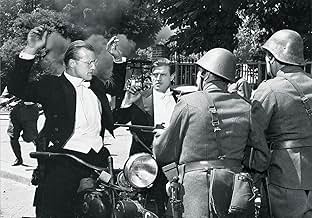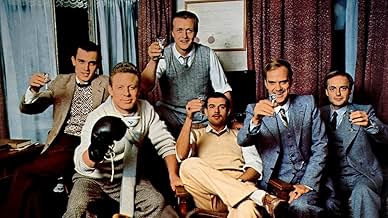VALUTAZIONE IMDb
7,6/10
14.469
LA TUA VALUTAZIONE
Aggiungi una trama nella tua linguaDuring World War II, Dutch students join the resistance movement against the German occupation of the Netherlands.During World War II, Dutch students join the resistance movement against the German occupation of the Netherlands.During World War II, Dutch students join the resistance movement against the German occupation of the Netherlands.
- Regia
- Sceneggiatura
- Star
- Premi
- 1 vittoria e 2 candidature totali
Reinhard Kolldehoff
- Geisman
- (as René Kolldehoff)
Recensioni in evidenza
Soldaat van Oranje is Paul Verhoeven's war movie, one that already shows his early leaning towards grungy realism - graphic torture, debased human nature and plenty of bare boobies - which is why it had a pretty mixed reception when it came out here in Holland.
This story is told from the point of view of a number of well to do Leiden University students. For clarification, very few people before the war had the finances to go to university.
Highlighting some now internationally famous Dutch actors - Rutger Hauer, Derek de Lint, Jeroen Krabbé as well as locally known actors like Belinda Meuldijk, Rijk de Gooyer and this is also a showcase of acting talent during the seventies and early eighties. British seventies actors Susan Penhaligon and Edward Fox (A Bridge Too Far) also have interesting performances.
Based on the memoirs of Erik Hazelhoff Roelfzema (Erik Lanshof in the movie), this is a reasonably realistic and truthful recounting of war and resistance during world war two. Roelfzema, a genuine war hero, first joined the student resistance, then the SOE, then joined the RAF and finally became an adjudant (aide) to queen Wilhelmina. He is still spritely and alive, living in Hawaii with his English wife.
It is also pretty unique as it features what must be cinema's first and only drive-by-shooting from a bicycle. And one with wooden tires at that. And a great yarn too. It has heroism and cowardice, loyalty and betrayal, relativism, principles and pragmatism. Recommended.
This story is told from the point of view of a number of well to do Leiden University students. For clarification, very few people before the war had the finances to go to university.
Highlighting some now internationally famous Dutch actors - Rutger Hauer, Derek de Lint, Jeroen Krabbé as well as locally known actors like Belinda Meuldijk, Rijk de Gooyer and this is also a showcase of acting talent during the seventies and early eighties. British seventies actors Susan Penhaligon and Edward Fox (A Bridge Too Far) also have interesting performances.
Based on the memoirs of Erik Hazelhoff Roelfzema (Erik Lanshof in the movie), this is a reasonably realistic and truthful recounting of war and resistance during world war two. Roelfzema, a genuine war hero, first joined the student resistance, then the SOE, then joined the RAF and finally became an adjudant (aide) to queen Wilhelmina. He is still spritely and alive, living in Hawaii with his English wife.
It is also pretty unique as it features what must be cinema's first and only drive-by-shooting from a bicycle. And one with wooden tires at that. And a great yarn too. It has heroism and cowardice, loyalty and betrayal, relativism, principles and pragmatism. Recommended.
Based on true events, the film provides a wide temporal overview of different destinies students of different ethnicities and background had to face during World War II. This big war ruined lots of relations and comprehensions, but unlike in Eastern-European countries, occupation and its consequences remained relatively short-time, and the confrontation was still on the so-called centre/right level. For example, fate of the Baltic nations was even more tragic and disruptive...
Anyway, the film in question is well written, directed and played; names like Paul Verhoeven, Rutger Hauer and Jeroen Krabbé are currently internationally known and appraised, before that they were active mostly in the local scene. Hauer and Krabbé are real character actors, having also distinctive appearance, not just cute face / gleaming smile so characteristic to many US counterparts. On the other hand, if necessary, they are also talented team players, merging well with background and co-performers; the latter are also strong and even, and the Brits and Germans are played by respective native-speakers.
A powerful film, recommended to all those fond of war dramas.
Anyway, the film in question is well written, directed and played; names like Paul Verhoeven, Rutger Hauer and Jeroen Krabbé are currently internationally known and appraised, before that they were active mostly in the local scene. Hauer and Krabbé are real character actors, having also distinctive appearance, not just cute face / gleaming smile so characteristic to many US counterparts. On the other hand, if necessary, they are also talented team players, merging well with background and co-performers; the latter are also strong and even, and the Brits and Germans are played by respective native-speakers.
A powerful film, recommended to all those fond of war dramas.
This film hit a grand slam by successfully achieving all of the things I hope for in a movie: it entertained me, it educated me, it charmed me, and it provoked me. I have lived in the Netherlands and love the Dutch people, so I was happy to view this film and see many familiar sites and understand some of the Dutch dialogue. It provided me with a sense of deja vu. I also learned things about the Dutch World War II experience that I previously was unaware of. The vast majority of the world only has one thought when it comes to WWII and the Dutch: Anne Frank. It's heartening to watch a film that explores many other facets of the Dutch experience during occupation, and that doesn't promote an all-rosy view wherein everyone is heroic. It is a realistic film that showed the complications of war and occupation, the desire for self-survival, the limits of patriotism, the fragility of war-time romances, and the bravery and sacrifices that some, but not all, are willing to exhibit. My heart was in my throat many times as I wondered what would happen and, although the movie is almost two and a half hours, I was sorry to see it end.
I was told by a Dutch priest friend that his country's soldiers responded to the German invasion riding on bicycles. And they were confronted by Panzer divisions.
Apart from the films about the Ten Boom family and their heroic exploits in saving Dutch Jews from the death camps (e.g. The Hiding Place), there are few cinematic efforts portraying Dutch resistance against the Nazis. Soldier of Orange was therefore an eye-opener. One would have thought that the Dutch, because of their proximity to Germany, with their cognate languages would have succumbed to Anschluss as did Austria. The stoic courage of Queen Wilhelmina in insisting on staying with her people even after it was clear that Dutch forces had collapsed in the face of the German Blitzkrieg was touching. Only reluctantly did she accept the advice of her ministers that she would be more effective as a symbol of resistance abroad persuaded her to accept the British offer to fly her out of her beloved country.
And yet, despite the exciting episodes of Dutch resistance and espionage against the German occupiers, what proved more interesting to me was the depiction of student life at the universities. I was both fascinated and appalled at the extent and brutality of the hazing undergone by the lower classmen which included the character of Rutger Hauer. In my country, the Philippines, such hazing have led to several deaths and although condemned in general, they go on.
Apart from the films about the Ten Boom family and their heroic exploits in saving Dutch Jews from the death camps (e.g. The Hiding Place), there are few cinematic efforts portraying Dutch resistance against the Nazis. Soldier of Orange was therefore an eye-opener. One would have thought that the Dutch, because of their proximity to Germany, with their cognate languages would have succumbed to Anschluss as did Austria. The stoic courage of Queen Wilhelmina in insisting on staying with her people even after it was clear that Dutch forces had collapsed in the face of the German Blitzkrieg was touching. Only reluctantly did she accept the advice of her ministers that she would be more effective as a symbol of resistance abroad persuaded her to accept the British offer to fly her out of her beloved country.
And yet, despite the exciting episodes of Dutch resistance and espionage against the German occupiers, what proved more interesting to me was the depiction of student life at the universities. I was both fascinated and appalled at the extent and brutality of the hazing undergone by the lower classmen which included the character of Rutger Hauer. In my country, the Philippines, such hazing have led to several deaths and although condemned in general, they go on.
SOLDIER OF ORANGE is a film about a group of friends who encounter the occupation of Holland by the Germans in different ways. The film splits up it's time dealing with the stories of the friends and that of one of them who becomes a high ranking member of the OSS and close political ally to the queen of Holland. The film, set during WW2, is even handed in it's approach. SOLDIER OF ORANGE is a unusual film and was made with a high degree of quality. The film goes for a sense of realism not often seen in cinema, the film,made in Holland is in dutch yet in the sequences in england it is in English. I recommend this film to WW2 buffs and fans of art-house cinema alike. Both groups will be pleased as will foreign film fans who can be assured of finding something worthwhile.
Lo sapevi?
- QuizThe explosions in this movie were provided not by special effects technicians, but by the Dutch Marines. In his DVD commentary on this movie, director Paul Verhoeven states that the explosive charges were held in place with metal. When one of the charges was set off, it blew the metal to bits. One of the flying fragments nearly killed Rutger Hauer.
- BlooperIt is correct that Dutch squadrons where not equipped with Moquito airplanes but not every Dutch pilot was flying with a Dutch squadron. Some of them flew with regular RAF squadrons. Erik Hazelhof Roelfzema (played by Rutger Hauer) actually flew Mosquito's for a RAF squadron.
- Citazioni
Geisman: Did you write that?
Erik Lanshof: Sir, yes sir.
Geisman: What did you write that with?
Erik Lanshof: Sir, with shit, sir.
- Versioni alternativeThe German video version released in 1988 was heavily cut for about 35 min., in 2007 this film was finally released uncut in Germany as part of the "Paul Verhoeven-Klassiker Edition".
I più visti
Accedi per valutare e creare un elenco di titoli salvati per ottenere consigli personalizzati
Dettagli
- Data di uscita
- Paesi di origine
- Lingue
- Celebre anche come
- Soldier of Orange
- Luoghi delle riprese
- Noordwijk, Zuid-Holland, Paesi Bassi(Hotel Huis Ter Duin and beach)
- Aziende produttrici
- Vedi altri crediti dell’azienda su IMDbPro
Botteghino
- Budget
- 5.000.000 NLG (previsto)
- Tempo di esecuzione2 ore 35 minuti
- Mix di suoni
- Proporzioni
- 1.85 : 1
Contribuisci a questa pagina
Suggerisci una modifica o aggiungi i contenuti mancanti

Divario superiore
What is the Brazilian Portuguese language plot outline for Soldato d'Orange (1977)?
Rispondi




























